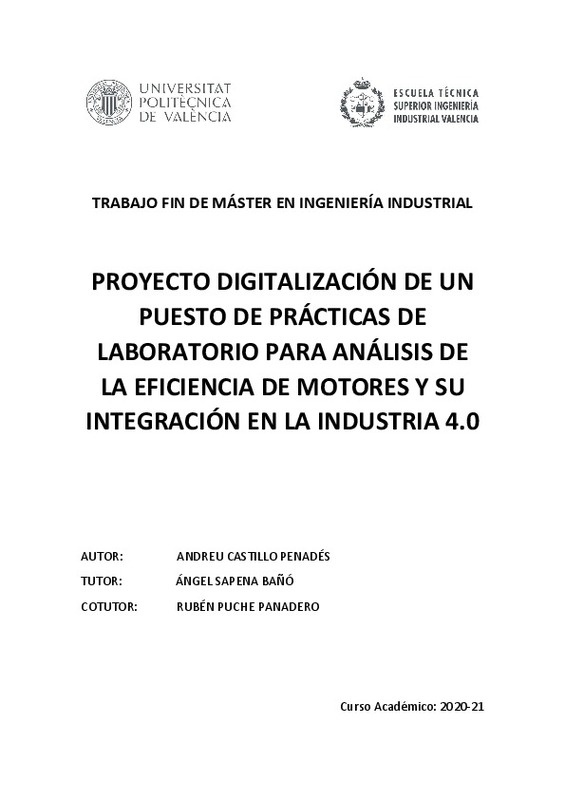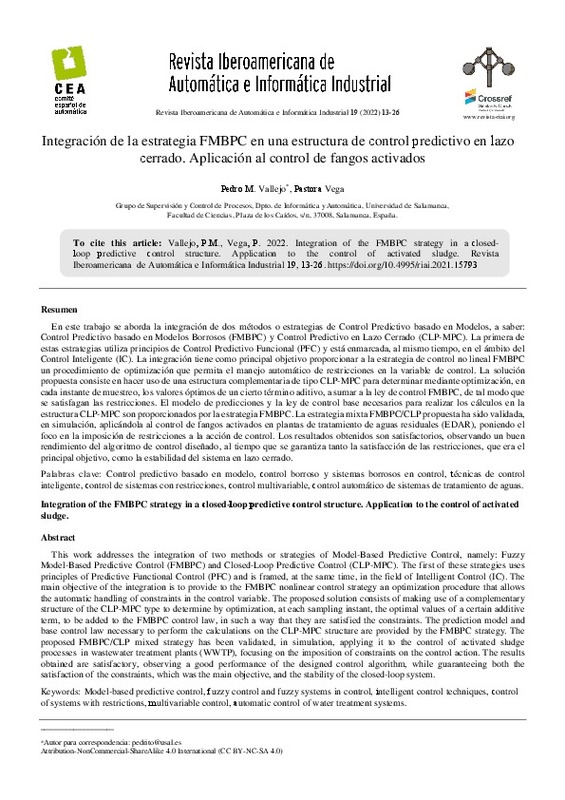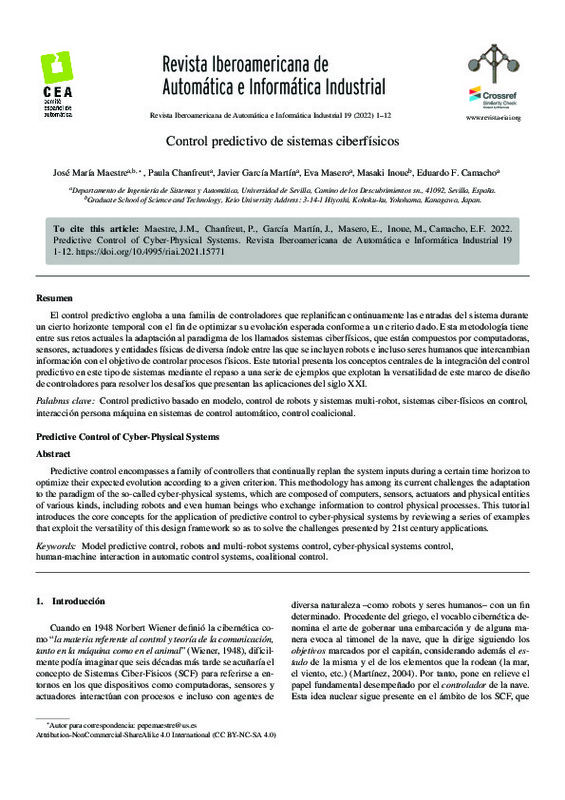JavaScript is disabled for your browser. Some features of this site may not work without it.
Buscar en RiuNet
Listar
Mi cuenta
Estadísticas
Ayuda RiuNet
Admin. UPV
PROYECTO DIGITALIZACIÓN DE UN PUESTO DE PRÁCTICAS DE LABORATORIO PARA ANÁLISIS DE LA EFICIENCIA DE MOTORES Y SU INTEGRACIÓN EN LA INDUSTRIA 4.0
Mostrar el registro sencillo del ítem
Ficheros en el ítem
| dc.contributor.advisor | Sapena Bañó, Ángel
|
es_ES |
| dc.contributor.advisor | Puche Panadero, Rubén
|
es_ES |
| dc.contributor.author | Castillo Penadés, Andreu
|
es_ES |
| dc.date.accessioned | 2021-10-13T15:30:36Z | |
| dc.date.available | 2021-10-13T15:30:36Z | |
| dc.date.created | 2021-09-27 | |
| dc.date.issued | 2021-10-13 | es_ES |
| dc.identifier.uri | http://hdl.handle.net/10251/174635 | |
| dc.description.abstract | [ES] El presente Trabajo de Fin de Máster aborda la digitalización de un banco de ensayos de accionamientos eléctricos disponible en el laboratorio del Departamento de Ingeniería Eléctrica de la UPV, donde se ha desarrollado íntegramente el proyecto. La citada digitalización consta de dos partes fundamentales: el diseño de un modelo digital del banco de ensayos y el diseño y desarrollo de un nuevo sistema basado en dispositivos de bajo coste que permita regular y monitorizar el puesto de prácticas de forma remota. Por una parte, se ha desarrollado en Matlab/Simulink un modelo digital del puesto de prácticas compuesto por el motor de inducción y el variador de frecuencia que lo alimenta, integrando en este último las diferentes estrategias de control que se pueden implementar en el sistema real, es decir, el control escalar, vectorial y directo de par. El modelo digital del motor de inducción se implementará mediante el sistema de ecuaciones diferenciales que lo define, permitiendo su adaptabilidad a otros lenguajes de programación. En cuanto a la parte experimental del proyecto, se ha desarrollado un sistema de bajo coste basado en un microcontrolador ESP32 que permite comandar los variadores de frecuencia del motor de inducción y de su carga resistente, un motor de imanes permanentes que actuará como generador. Además, el producto diseñado permite monitorizar diferentes magnitudes eléctricas y mecánicas del motor de inducción, tales como la velocidad, el par mecánico y el nivel de corriente consumida por el motor. La regulación y monitorización del banco de ensayos se efectúa a través de una aplicación para dispositivos móviles, diseñada en Android Studio, que permite modificar las consignas de velocidad o frecuencia y par de los variadores de frecuencia. A través de los protocolos de comunicación bluetooth y MQTT se monitorizan las diferentes magnitudes asociadas al banco de ensayos. Finalmente, la corriente consumida por el motor de inducción tiene su principal aplicabilidad en el análisis de la eficiencia de motores eléctricos, permitiendo comparar el nivel de corriente consumida por diferentes motores frente a las mismas condiciones de operación. Se realizarán un conjunto de ensayos alimentando diferentes motores directamente a red y a través del variador de frecuencia, realizando una comparativa del nivel de corriente consumida. | es_ES |
| dc.description.abstract | [EN] This Master's Thesis deals with the digitization of electric drive test bench available in the laboratory of the Department of Electrical Engineering of the UPV, where the project has been developed in its entirety. This digitization consists of two fundamental parts: the design of a digital model of the test bench and the design and development of a new system based on low-cost devices that allow remote regulation and monitoring of the test bench. On the one hand, a digital model of the training station has been developed in Matlab/Simulink, consisting of the induction motor and the frequency inverter that feeds it, integrating in the latter the different control strategies that can be implemented in the real system, i.e., scalar, vector and direct torque control. The digital model of the induction motor will be implemented by means of the system of differential equations that defines it, allowing its adaptability to other programming languages. As for the experimental part of the project, a low-cost system based on an ESP32 microcontroller has been developed to control the frequency variators of the induction motor and its resistant load, a permanent magnet motor that will act as a generator. In addition, the designed product allows the monitoring of different electrical and mechanical magnitudes of the induction motor, such as speed, mechanical torque and the level of current consumed by the motor. The regulation and monitoring of the test bench are carried out through an application for mobile devices, designed in Android Studio, which allows the speed or frequency and torque setpoints of the frequency inverters to be modified. The different magnitudes associated with the test bench are monitored via Bluetooth and MQTT communication protocols. Finally, the current consumed by the induction motor has its main applicability in the analysis of the efficiency of electric motors, making it possible to compare the level of current consumed by different motors under the same operating conditions. A series of tests will be carried out feeding the motors directly to the mains and through the frequency variator, comparing the level of current consumed. | es_ES |
| dc.format.extent | 164 | es_ES |
| dc.language | Español | es_ES |
| dc.publisher | Universitat Politècnica de València | es_ES |
| dc.rights | Reserva de todos los derechos | es_ES |
| dc.subject | Simulación | es_ES |
| dc.subject | Modelo digital | es_ES |
| dc.subject | Motor de inducción | es_ES |
| dc.subject | Control escalar | es_ES |
| dc.subject | Control vectorial | es_ES |
| dc.subject | Control directo de par | es_ES |
| dc.subject | Microcontrolador ESP32 | es_ES |
| dc.subject | Matlab | es_ES |
| dc.subject | Simulink | es_ES |
| dc.subject | Arduino IDE | es_ES |
| dc.subject | Android Studio | es_ES |
| dc.subject | Sensores | es_ES |
| dc.subject | Industria 4.0 | es_ES |
| dc.subject | Internet de las Cosas | es_ES |
| dc.subject | Accionamientos electromecánicos | es_ES |
| dc.subject | Simulation | es_ES |
| dc.subject | Digital model | es_ES |
| dc.subject | Induction motor | es_ES |
| dc.subject | Scalar control | es_ES |
| dc.subject | Vector control | es_ES |
| dc.subject | Direct torque control | es_ES |
| dc.subject | ESP32 microcontroller | es_ES |
| dc.subject | Sensors | es_ES |
| dc.subject | Industry 4.0 | es_ES |
| dc.subject | Internet of Things | es_ES |
| dc.subject | Electromechanical drives | es_ES |
| dc.subject.classification | INGENIERIA ELECTRICA | es_ES |
| dc.subject.other | Máster Universitario en Ingeniería Industrial-Màster Universitari en Enginyeria Industrial | es_ES |
| dc.title | PROYECTO DIGITALIZACIÓN DE UN PUESTO DE PRÁCTICAS DE LABORATORIO PARA ANÁLISIS DE LA EFICIENCIA DE MOTORES Y SU INTEGRACIÓN EN LA INDUSTRIA 4.0 | es_ES |
| dc.type | Tesis de máster | es_ES |
| dc.rights.accessRights | Abierto | es_ES |
| dc.contributor.affiliation | Universitat Politècnica de València. Departamento de Ingeniería Eléctrica - Departament d'Enginyeria Elèctrica | es_ES |
| dc.contributor.affiliation | Universitat Politècnica de València. Escuela Técnica Superior de Ingenieros Industriales - Escola Tècnica Superior d'Enginyers Industrials | es_ES |
| dc.description.bibliographicCitation | Castillo Penadés, A. (2021). PROYECTO DIGITALIZACIÓN DE UN PUESTO DE PRÁCTICAS DE LABORATORIO PARA ANÁLISIS DE LA EFICIENCIA DE MOTORES Y SU INTEGRACIÓN EN LA INDUSTRIA 4.0. Universitat Politècnica de València. http://hdl.handle.net/10251/174635 | es_ES |
| dc.description.accrualMethod | TFGM | es_ES |
| dc.relation.pasarela | TFGM\145608 | es_ES |
Este ítem aparece en la(s) siguiente(s) colección(ones)
-
ETSII - Trabajos académicos [10404]
Escuela Técnica Superior de Ingenieros Industriales









